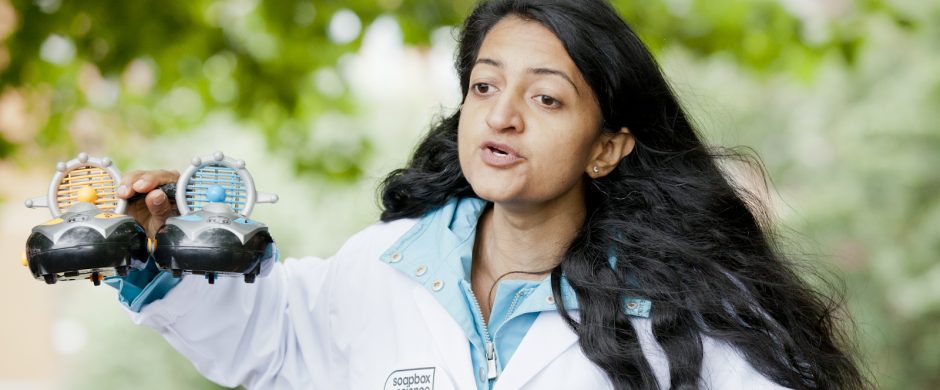 Dr Laura Evenstar (LE) is a Research Associate in the School of Earth Sciences at the University of Bristol where she studies landscape evolution of the Andean mountain chain. Today Laura talks to Soapbox Science (SS) about her work and how she got into her current position. You can come to here Laura speak about “The Atacama Desert – the oldest, direst desert in the world” on the 14th of June.
Dr Laura Evenstar (LE) is a Research Associate in the School of Earth Sciences at the University of Bristol where she studies landscape evolution of the Andean mountain chain. Today Laura talks to Soapbox Science (SS) about her work and how she got into her current position. You can come to here Laura speak about “The Atacama Desert – the oldest, direst desert in the world” on the 14th of June.
SS: Hi Laura, we are very excited to have you joining us at Soapbox Science Bristol this year, can you start by telling us a little bit about how you got where you are today?
LE: A mixture of many different things. I’ve tried to always go for every good opportunity that comes along, even if this has meant having time out from my career to run hostels in remote areas of Scotland or work in Ethiopia, but this has always made me passionate and happy about what I’m doing. There has also been a huge element of luck involved! My current job was perfect for me, based in Bristol and working in the Atacama Desert in Northern Chile. However, I wasn’t looking for a new job at the time it was advertised and only saw it two weeks after the closing deadline. I couldn’t pass up such a good opportunity so wrote a begging letter to the project leader asking for a chance! The interviews were 3 days later so I spent a frantic weekend jugging a 40hr shift at work, looking after my year old daughter and writing my presentation, all while my husband was away on a fieldtrip. Luckily everything went well.
SS: Gosh, that sounds like that must have been a stressful time but great that you are now in a position you enjoy and are passionate about. Was there anything or anyone who really inspired you to pursue a career in science?
LE: A combination of really enjoying science at school and loving going travelling. I wanted to travel to remote areas and see places few other people had been to but also do something useful while I was there. By building a career in geology, particularly in fieldwork based geology projects, it allowed to combine both of these things into a great job! I also had an amazing lecturer at Leeds University, Joe Cann, who really inspired me to want to teach in a fun way by throwing 5p pieces at people who got the questions right!
SS: So what is it about you current research that you find so fascinating?
LE: The variety. On month I’m camping under a boulder in a desert, the next I’ll be crushing rocks in a lab, the month after I’ll be in a conference in America presenting data. It’s great!
SS: Variety truly is the spice of life! However, If there was anything that you could change about the scientific culture right now what would it be?
LE: I feel what the scientific community could really benefit from is people having a more rounded approach to their subject. Scientists are quickly selected based on their specialised area and slightly obsessive behaviour around their subject. There are so many connections between biology, geography, geology and chemistry that I think we sometimes miss because we are so focused on our one area. I think science would make huge advances if it encouraged people with wider scientific knowledge and more life experience to participate.
SS: Do you have any advice for current female PhD students considering pursuing a career in academia?
Academia is a marathon, don’t be afraid to take time out of academia to try other things or have a family. It’ll still be there when you come back and you’ll enjoy it more.
SS: What was it that encouraged you to apply to be a Soapbox Scientist?
I really enjoy doing silly science experiments to explain my work and talking to audience so this seemed like a great opportunity to do both!
SS: And finally, can you sum up in one word about how you are felling about the day?
Fearcitment…..
